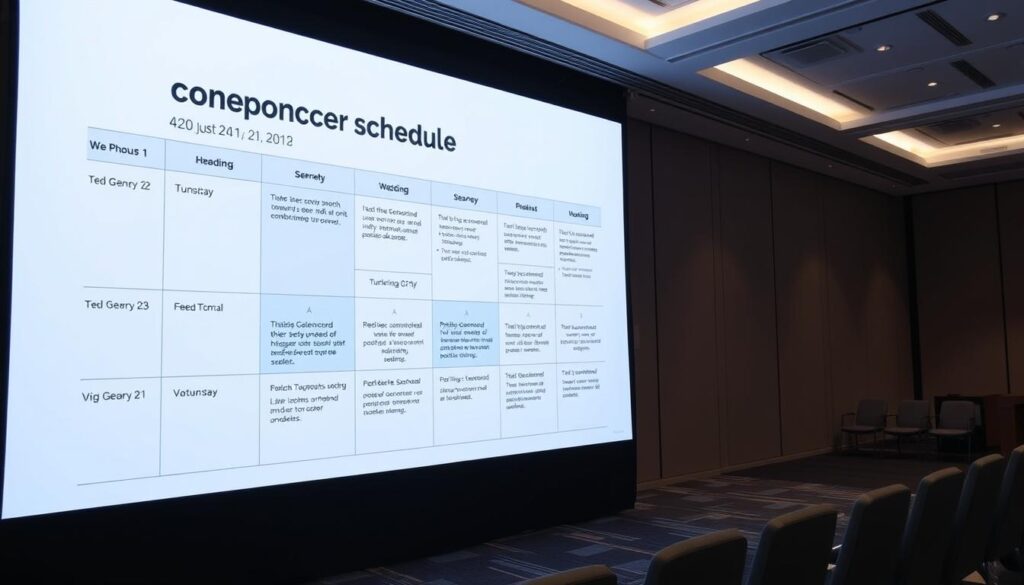Physical Address
304 North Cardinal St.
Dorchester Center, MA 02124
Physical Address
304 North Cardinal St.
Dorchester Center, MA 02124

Welcome to your go-to resource for creating unforgettable gatherings for the literary community. Organizing an event where writers connect, learn, and grow demands creativity and attention to detail. Whether you’re a seasoned coordinator or stepping into this role for the first time, this guide simplifies the process of building an engaging experience.
Successful events blend practical logistics with inspiring content. Venue choices, speaker selection, and scheduling all shape the attendee experience. For writers, these gatherings are more than just meetings—they’re opportunities to refine their craft, network with peers, and explore career paths.
Understanding your audience is crucial. Are participants seeking workshops on storytelling techniques? Do they prioritize connecting with literary agents? Tailoring your conference to these needs ensures relevance and value. This article delivers actionable tips, from early-stage brainstorming to post-event engagement, so you can design an event that resonates.
Expect clear, step-by-step advice paired with real-world examples. We’ll cover budget management, marketing strategies, and ways to foster meaningful interactions. Let’s transform your vision into a thriving hub for creativity and professional growth.
Designing an impactful writer-focused event begins with understanding its core purpose. Industry expert Jane Friedman identifies three key priorities for literary gatherings: skill enhancement, peer connections, and industry access. Most events succeed by specializing in one area rather than spreading resources thin.
Clear goals act as your event’s compass. Craft development workshops help authors refine techniques, while networking sessions build collaborative relationships. Pitching opportunities bridge the gap between creators and publishing professionals.
| Primary Focus | Key Activities | Attendee Benefit |
|---|---|---|
| Skill Building | Writing workshops | Improved storytelling techniques |
| Networking | Peer critique sessions | Expanded professional circle |
| Industry Access | Agent pitch slots | Career advancement opportunities |
Your participants’ needs dictate every decision. Emerging writers often seek skill-building, while experienced authors prioritize industry connections. Venue size and session formats should reflect these preferences.
Transparent communication helps manage expectations. Pre-event guides explaining session types and networking etiquette empower participants. Post-event surveys then measure satisfaction and guide future improvements.
A supportive environment encourages meaningful interactions. Icebreaker activities and moderated discussions help build trust within the literary community. These connections often extend beyond the event itself.
Crafting a memorable event starts with crystal-clear intentions. What do you want participants to gain? Skill-building workshops, networking circles, or direct access to publishing professionals? Choosing one primary focus creates direction while allowing room for complementary activities.
The Writer’s Digest Conference prioritizes career advancement through its legendary pitch sessions. Over 50 agents and editors attend annually, creating unmatched opportunities for author-industry connections. Meanwhile, the Midwest Writers Workshop limits attendance to 300 writers, fostering intimate craft-focused discussions.
Ask yourself:
Trying to excel in all areas often weakens impact. A mentorship program might complement pitch sessions without overshadowing them. Schedule networking breaks between workshops, letting relationships form naturally.
Successful events allocate 60-70% of time to their core goal. Track attendee feedback through post-event surveys. Did participants leave with improved skills or valuable contacts? Measure what matters most.
Creating an event that resonates with authors requires strategic design choices from the ground up. The Belize Writers Conference exemplifies this approach—launched by a nonprofit veteran, it carved its niche by connecting creators with literary agents. This targeted focus helped triple attendance within three years.
Event structure determines participant engagement. Consider these formats:
| Format Type | Best For | Key Features | Example |
|---|---|---|---|
| Intimate Gatherings | Skill Development | Workshops with personalized feedback | Midwest Writers Workshop |
| Specialized Events | Industry Connections | Agent pitch sessions, keynote panels | Belize Writers Conference |
| Large-Scale Conventions | Networking Diversity | Multiple tracks, vendor exhibitions | Writer’s Digest Conference |
Organizers with nonprofit or freelance backgrounds possess transferable skills. Budget management and donor relations from nonprofit work translate well to event planning. Marketing strategies used in freelance businesses help attract sponsors.
The Belize team’s resilience proves essential—adapting to venue changes and last-minute speaker cancellations while maintaining attendee satisfaction. Founder Sarah Davis notes: “Consistent branding and post-event surveys fueled our growth from 80 to 300 participants.”
Early events build credibility. Share testimonials and participation rates when recruiting future speakers. Each iteration strengthens your reputation within the literary community.
The foundation of every successful literary event lies in thoughtful location and timing choices. Where you host impacts everything from networking potential to session productivity. Jane Friedman emphasizes that 72% of attendees prefer staying at the event hotel for convenience and spontaneous interactions.

Hotels often outperform university spaces by offering integrated amenities. On-site lodging reduces travel time and fosters late-night brainstorming sessions. The Belize Writers Conference learned this firsthand—switching from a rustic retreat to a climate-controlled resort boosted satisfaction by 40%.
Prioritize spaces with adjustable lighting, reliable Wi-Fi, and accessible breakout rooms. Test acoustics during site visits—echoey halls derail workshops. A hotel ballroom with movable partitions accommodates both large keynotes and small critique circles.
Spring and fall dates avoid summer vacations and holiday conflicts. Check regional event calendars—scheduling near book festivals might attract overlapping attendees. Coastal locations in May or September offer pleasant weather without peak pricing.
Local connections matter. Writers from the same region often collaborate post-event. A Chicago-based conference could spark a Midwestern authors’ collective, while a Texas venue might highlight regional publishers.
Build buffer days into your schedule for setup and teardown. Morning workshops followed by afternoon networking create natural rhythm. Always confirm catering cut-off times—cold coffee kills momentum.
The backbone of any impactful literary event lies in its people. Your speakers and advisors shape attendee experiences through expertise, energy, and engagement. Start by identifying professionals whose skills match your audience’s aspirations.
Big-name keynotes attract attention, but breakout sessions drive real growth. As Jane Friedman notes: “A-list authors draw crowds, but emerging speakers often deliver the actionable advice writers need.” The Belize Writers Conference team studies online interviews to find agents actively acquiring clients. They prioritize those with strong facilitation skills and approachable personalities.
Three traits define ideal presenters:
When recruiting, highlight mutual benefits. Mention exposure to targeted audiences or opportunities to test new workshop concepts. Many professionals value platforms to connect with dedicated authors.
An advisory board of respected writers and agents lends credibility while shaping programming. These veterans help:
Look for advisors who actively participate in literary communities. Regular check-ins keep them invested in your event’s success. Their endorsement can also attract first-time attendees seeking trusted recommendations.
A well-structured agenda transforms events from ordinary to extraordinary. Thoughtful time management keeps energy high while allowing meaningful connections. The secret lies in mixing focused learning with organic networking moments.

Breakout sessions thrive when they tackle specific skills. Limit groups to 25 participants for hands-on activities. Two-hour workshops let authors draft query letters or refine dialogue techniques with expert feedback.
Jane Friedman advises: “Panels drown in generic talk when they should spark debate.” Reserve them for trending topics like audiobook markets or genre shifts. Always choose moderators who can highlight contrasting viewpoints.
Schedule pitch opportunities after skill-building sessions. Authors apply new techniques while ideas stay fresh. Clear time slots prevent rushed conversations—15-minute agent meetings work best with prepared materials.
Build buffer periods between events. Coffee breaks become networking goldmines when placed after intense panels. End days early enough for dinner collaborations among attendees.
Remember: A rigid schedule stifles creativity. Leave white space for spontaneous brainstorming or follow-up questions. Your attendees’ best ideas might emerge during unscheduled moments.
Effective promotion transforms events from ideas into must-attend gatherings. Start by crafting messages that spotlight your unique strengths. Are you offering rare access to literary agents? Do workshops provide actionable revision techniques? Highlight these benefits early and often.
Jane Friedman advises: “Launch social campaigns 6-9 months ahead—build anticipation like a book release.” Research where your ideal attendees gather online. Romance writers frequent Facebook groups, while poets dominate Instagram. Tailor content to these spaces.
Share success stories from past events. Testimonials like “Landed my agent through conference connections” prove value. Include speaker quotes in promotional materials to boost credibility. The Belize team increased registrations by 35% using author video endorsements.
Create a dedicated event hashtag for real-time updates. Schedule weekly posts mixing practical tips (“3 ways to prep for pitch sessions”) and behind-the-scenes glimpses. Tag featured speakers when sharing their published work.
Email sequences should guide people from curiosity to commitment. Send:
Track open rates to refine messaging. One founder discovered Thursday emails outperformed Mondays by 22%—adjust based on your audience’s habits.
Transform passive listeners into active collaborators through intentional design. Successful events spark conversations that continue long after sessions end. Start by empowering attendees with tools to connect before they arrive.
Jane Friedman advises: “Pre-event engagement builds momentum. Research speakers’ latest projects and share insights using the conference hashtag.” Encourage participants to:
| Networking Phase | Attendee Action | Organizer Support |
|---|---|---|
| Pre-Event | Connect with 2-3 participants online | Share attendee interest survey results |
| During Event | Join skill-based lunch groups | Provide conversation starter kits |
| Post-Event | Schedule virtual follow-ups | Create private alumni networks |
Monitor engagement through live polls and session chatbots. When 40% of participants request deeper genre discussions at a recent conference, organizers added impromptu breakout rooms. Post-event surveys should ask:
Adjust programming dynamically. Shift popular workshops to larger rooms. Extend Q&A time when discussions ignite. As one organizer noted: “Our lightning feedback system lets us course-correct before energy fades.”
Building lasting impact in the writing community requires patience and persistence. The Belize Writers Conference founder committed to a five-year vision, understanding that reputation grows through consistent effort. Early events plant seeds for future success—each iteration strengthens attendee bonds and refines your approach.
Lasting impact thrives when creators feel supported. Nurture relationships beyond the conference weekend through alumni networks or virtual check-ins. One agent connection or collaborative project can transform writing careers.
“Invest in your attendees, and they’ll invest in you,” shares the Belize team. Celebrate milestones publicly while planning improvements privately. With each edition, your conference becomes a cornerstone for authors seeking growth and connection.